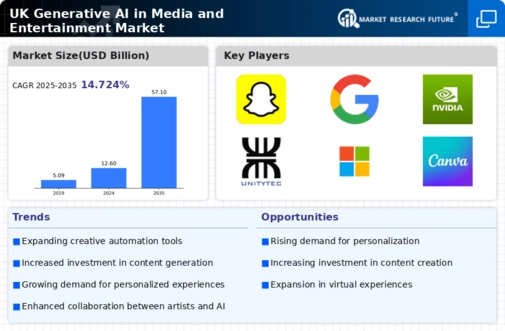Technological Advancements in AI
The rapid evolution of AI technologies is a primary driver for the generative ai-in-media-and-entertainment market. Innovations in machine learning algorithms and neural networks enhance the capabilities of content generation, enabling creators to produce high-quality media with unprecedented efficiency. In the UK, the AI sector is projected to contribute £630 billion to the economy by 2035, indicating a robust growth trajectory. This technological progress allows for the automation of various creative processes, from scriptwriting to video editing, thereby reducing production costs and time. As a result, media companies are increasingly adopting generative AI tools to stay competitive, suggesting a shift towards more innovative content creation methods. The integration of AI into traditional media workflows is likely to redefine industry standards, making it a crucial factor in the market's expansion.
Consumer Demand for Interactive Content
There is a growing consumer appetite for interactive and immersive content, which significantly influences the generative ai-in-media-and-entertainment market. Audiences in the UK are increasingly seeking personalized experiences that engage them on a deeper level. This trend is reflected in the rising popularity of interactive storytelling and gaming, where generative AI plays a pivotal role in creating dynamic narratives. According to recent studies, 70% of UK consumers express a preference for content that adapts to their choices, highlighting the potential for AI-driven solutions. As media companies strive to meet these evolving expectations, the demand for generative AI technologies is expected to surge. This shift not only enhances viewer engagement but also opens new revenue streams, as businesses explore subscription models and in-app purchases linked to personalized content.
Cost Efficiency and Resource Optimization
The generative ai-in-media-and-entertainment market is significantly driven by the need for cost efficiency and resource optimization. Media production can be resource-intensive, often requiring substantial financial investment and time. Generative AI technologies offer solutions that streamline workflows, reduce manual labor, and lower production costs. In the UK, companies that have integrated AI tools report a reduction in production time by up to 30%, allowing for quicker turnaround on projects. This efficiency not only benefits established media firms but also empowers smaller creators and startups to enter the market with lower barriers to entry. As the industry continues to embrace these technologies, the potential for increased profitability and sustainability becomes apparent, making cost efficiency a vital driver in the generative ai-in-media-and-entertainment market.
Regulatory Frameworks and Ethical Standards
The establishment of regulatory frameworks and ethical standards is becoming increasingly relevant in the generative ai-in-media-and-entertainment market. As AI technologies advance, concerns regarding copyright, data privacy, and ethical use of AI-generated content are gaining prominence. In the UK, regulatory bodies are actively working to create guidelines that ensure responsible AI usage in media. This proactive approach aims to protect creators' rights while fostering innovation. Companies that adhere to these standards may gain a competitive advantage, as consumers are more likely to support brands that demonstrate ethical practices. The evolving regulatory landscape could shape the future of the generative ai-in-media-and-entertainment market, influencing how companies develop and deploy AI technologies in their creative processes.
Collaboration Between Tech and Creative Industries
The intersection of technology and creativity is fostering collaboration that propels the generative ai-in-media-and-entertainment market forward. Partnerships between tech firms and creative agencies are becoming increasingly common, as both sectors recognize the value of combining their expertise. In the UK, initiatives such as innovation hubs and incubators are emerging to support this collaboration, facilitating the development of AI-driven creative tools. This synergy not only enhances the quality of content produced but also encourages the exploration of new formats and genres. As these partnerships grow, they are likely to lead to groundbreaking projects that redefine audience engagement. The collaborative nature of this trend suggests a promising future for the generative ai-in-media-and-entertainment market, as it continues to evolve through shared knowledge and resources.
























Leave a Comment